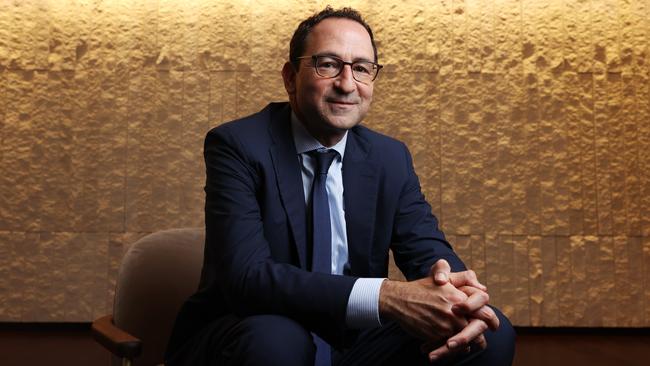Office towers feeling the pressure, says Blackstone chief
The world’s top investor believes that the office market has re-rated at a lower level, but it will still deal in top projects.

Private equity and property giant Blackstone believes that office property has been re-rated at a lower level than before the pandemic struck, but is seeing opportunities at the premium end of the market.
Blackstone chief operating officer Jon Gray says office property is caught up in a global phenomenon where Covid-19 and remote work reduced demand for assets.
“Office buildings have historically been the most capital intensive form of real estate,” he said. “And people, because they were viewed as trophies, didn’t focus on that.”
Blackstone had “de-emphasised” office investing, with Mr Gray saying “it’s been a small piece of what we do, particularly in the US, because of the capital intensity, and now it’s gotten this double hit from the remote work”.

Mr Gray acknowledged the wider impact of rate tightening and the flow through to commercial real estate, particularly on offices.
“All real estate has been impacted by higher rates and higher cap rates. I think the office sector has re-rated to a lower level,” he said.
“And you see that in the prices of the buildings as a trade.” But, I think there ultimately could be opportunities because of new modern buildings; I think companies will find that it’s hard to operate virtually. And there’s going to be a lot less construction of office buildings.”
Mr Gray flagged that Blackstone – which has in earlier cycles been an active office investor – could again become interested at the right levels.
“So I think we would be very focused on more modern buildings that are more sustainably oriented, that are highly functional for tenants that we could now buy at much more reasonable prices than we could three or four years ago,” he said.

Mr Gray called out the parlous position of ageing stock – where the firm has very little exposure – and the potential for alternative use projects. “I think older office buildings, that’s a very challenging subset” he said.
“You know, we’re not really there. I think those are often about change of use, where you’re buying in at a very low basis. Could be residential conversions. Who knows?”
There are still opportunities for Blackstone to make acquisitions that stack up, but only at the better end of the market. “I would say our focus when a sector falls out of favour here is to try to buy the best quality assets you could,” Mr Gray said, noting local conditions are better than his home market.
“I will say that the Australian office market is much healthier than the US office market. And the value declines have not been as significant.” Mr Gray pointed to the broad range of value shifts worldwide, and Blackstone is also exiting some offices profitably. “We just sold a very high quality office building in Seoul, that sold at a price that was probably meaningfully up from where it was pre-Covid,” he said.
He highlighted parts of Asia where offices were still thriving.
“In Japan and Korea, those markets have been unaffected,” he said. “The US has been the most affected, and Australia is probably somewhere in between.”

Mr Gray told The Australian that the firm would react early as the economic outlook changed – flagging, it could move quickly when investing.
“Before we get to a little more certainty about lower rates – and people are still hesitant, borrowing costs are elevated – we’re trying to lean in a little more,” he said.
Blackstone has already been active. This month, it completed a $US3.5bn ($5.31bn) cash deal to acquire Canadian rental housing company Tricon Residential.
Last month, it unveiled a takeover of private rental housing firm Apartment Income REIT, known as AIR Communities, for $10bn in cash, including debt, which was taken as a sign that interest rates were stabilising, lowering pressures in the commercial real estate market.
Mr Gray said the firm was moving before others were looking in the sector. “A lot of people are still scared about real estate,” he said.
“Part of that is probably a conscious leaning forward by us, to be maybe a little bit ahead in some areas, because I think the risk when you go through a downturn – we saw this in the early 90s, a little bit in the early 2000s, certainly after the GFC – is everybody gets really cautious,” he said.
“And so when you’re in this period, after a downturn, prices, correct, M&A volumes fall, people are more cautious. “But generally, these tend to be better transactions.”
Blackstone’s style remains opportunistic, even as it takes an upbeat perspective.
“I think the risk at times, after you go through a downturn, is you just focus on the ‘glass half empty’. And what you want to say is: ‘Is there more opportunity here’, particularly in some of the sectors, like technology and growth or real estate, that have been really beaten up?” Mr Gray said.
Eric Johnston is an associate editor of The Australian




To join the conversation, please log in. Don't have an account? Register
Join the conversation, you are commenting as Logout